Newspapers
About Andrew Cusack
 Writer, web designer, etc.; born in New York; educated in Argentina, Scotland, and South Africa; now based in London.
Writer, web designer, etc.; born in New York; educated in Argentina, Scotland, and South Africa; now based in London. read more
News
Blogs
Reviews & Periodicals
Arts & Design
World
France
Mitteleuropa
Knickerbockers
Argentina
The Levant
Africa
Cape of Good Hope
Netherlands
Scandinavia
Québec
India
Muscovy
Germany
Academica
Articles of Note: 13 March 2024

My then-flatmate was getting married the next day and much pottering-about sorting things was required but the idiosyncratic beauty of this building captured my imagination — part Norman, part Moorish. I was almost insulted that I hadn’t come across it in any of my bookish explorations.
The historian Edmund Harris covers Chideock in his lusciously illustrated post on Recusancy in Dorset and the ‘other tradition’ of Catholic church-building.
■ Generations ago it was said that the three institutions no British politician dared offend were the trade unions, the Catholic Church, and the Brigade of Guards. In 2020s Britain there is only one caste which must always be obeyed: the ageing, moneyed homeowners.
Not only do these “NIMBYs” (“Not In My Back Yard”) jealously guard their freeholds, they do whatever they can to prevent more houses being built to guard the value of their prize possessions, vastly inflated by a combination of lacklustre housebuilding and irresponsible leap in migration. As old people vote and young people don’t — and when they do, vote badly — few sensible people can find a way out of this quagmire.
It might be worth looking to the Mediterranean, where Tal Alster tells us How Israel turned urban homeowners into YIMBYs.
■ It’s disappointingly rare to see intelligent outsiders give a considered impression of the current state of play in the Netherlands — that’s Mother Holland for us New Yorkers. Too often commentators in English are either rash cheerleaders for the hard right or bien-pensant liberals eager to castigate and chastise. Both rush to judgement.
What a rare diversion then to read Christopher Caldwell — the only thinking neo-con? — attempt to explore and explain the success of Geert Wilders in the recent Dutch elections.
■ One in ten of Lusitania’s inhabitants are now immigrants, and this discounts those — many from Brazil and other former parts of the once-world-spanning Portuguese empire — who have managed to acquire citizenship through various routes.
Ukrainian number-plates are now frequently be seen on the roads of Lisbon, as far in Europe as you can get from Big Bad Uncle Vlad.
Vasco Queirós asks: Who is Portugal for?
■ Speaking of world-spanning empires, in true andrewcusackdotcom fashion, we haven’t had enough of the Dutch — but we have had enough of their wicked wayward heresies.
Historian Charles H. Parker explores the legacies of Calvinism in the Dutch empire.
■ The City of New York itself is the best journalism school there is. Jimmy Breslin dropped out of LIU after two years, eventually taking up his pen. Pete Hamill left school at fifteen, apprenticed as a sheet metal worker, and joined the navy.
William Deresiewicz argues that a dose of working-class realism can save journalism from groupthink.
■ The New Yorker tells us how a Manchester barkeep found and saved a lost (ostensible) masterpiece of interwar British literature.
■ Our inestimable friend Dr Harshan Kumarasingham explores David Torrance’s history of the first Labour government on its hundredth anniversary.
■ And finally, one for nous les normandes (ok, ok, celto-normandes): Canada’s National Treasure David Warren briefly muses that the Norman infusion greatly refined Anglo-Saxon to give us the superior English tongue we speak today.
La Bougie du sapeur
Lo, the Twenty-Ninth of February is upon us, which means another edition of the French newspaper La Bougie du sapeur. The printing of a newspaper is not often news itself, for most are dailies and some are weeklies. That rara avis, the fortnightly is — like the monthly — more common amongst magazines. But La Bougie du sapeur is unique in the world as it only comes out on this date, the once-every-four-years leap day. (Or, as the French foppishly put it, bissextile.)
This is the twelfth number of La Bougie, an amazingly indolent feat for a newspaper that began in 1980. Perhaps they take their inspiration from the venerable and beloved Académie française, which was given the task of drafting the dictionary of the French language back in the 1680s, and finally reached midway through the letter “E” in 1992.
The 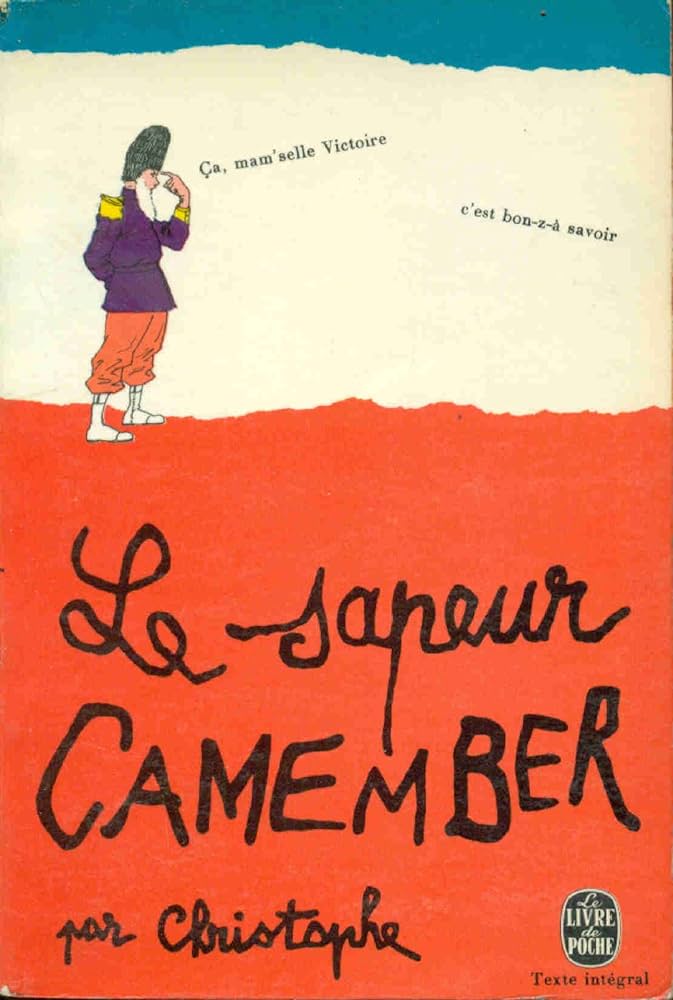 paper’s name translate as the Sapper’s Candle (for those outside of Angledom, “sapper” is another word for a soldier in the engineers). The soldier in question is Sapeur Camember, a stock character of French comic strips popularised by “Christophe” (Marie-Louis-Georges Colomb) in the pages of Le Petit Français illustré between 1890 and 1896.
paper’s name translate as the Sapper’s Candle (for those outside of Angledom, “sapper” is another word for a soldier in the engineers). The soldier in question is Sapeur Camember, a stock character of French comic strips popularised by “Christophe” (Marie-Louis-Georges Colomb) in the pages of Le Petit Français illustré between 1890 and 1896.
Camember was born on 29 February and thus had only celebrated four birthdays by the time he enlisted in the army. Every leap year thus adds another candle on the sapeur’s birthday cake. The character seeped into the French mind, and there is even a statue of him in Lure.
The newspaper was born in 1980 as a bit of an in-joke between two friends, Jacques Debuisson and Christian Bailly, and Jean d’Indy (pictured above and below) is currently at the helm as editor and director. (His day job is working for the French body responsible for flat racing and steeplechases.)
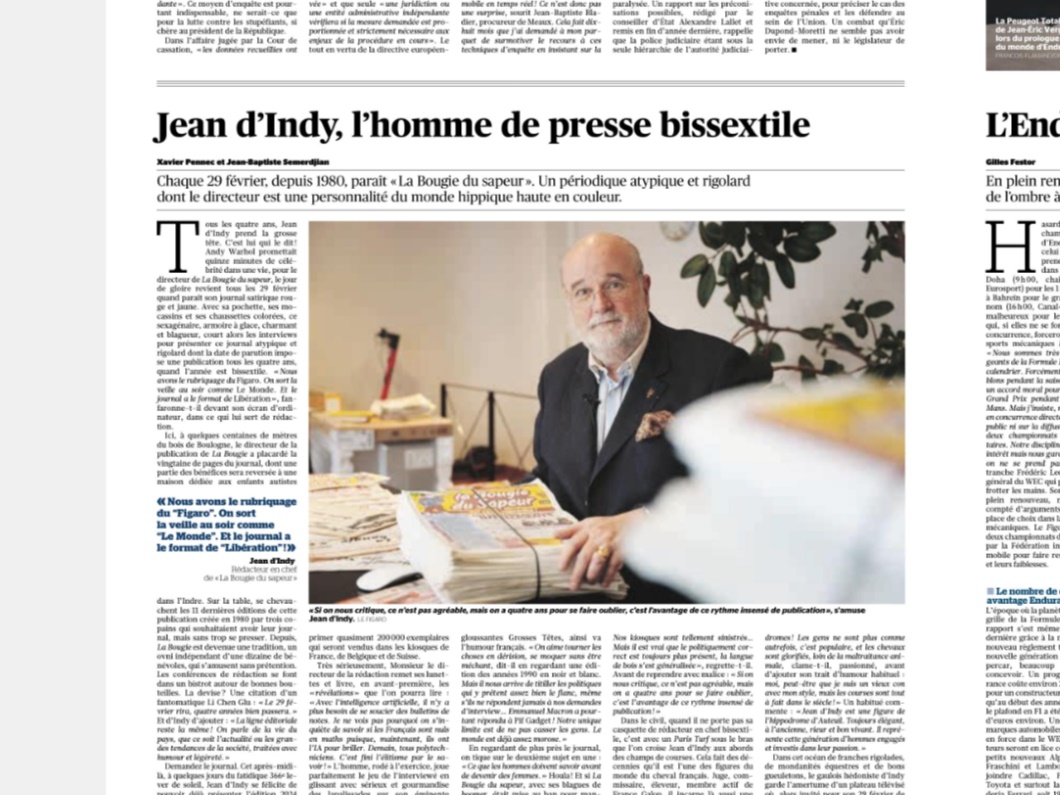
Ever with an eye on expansion, La Bougie began to print a Sunday supplement in 2004, to appear even more rarely whenever 29 February falls on a Sunday. The next issue of the Dimanche supplement is expected in 2032. This year marks the advent of their sports supplement, La Bougie du sapeur – Sportif.
The tone of La Bougie is satirical, mocking, and politically incorrect — but not without a heart. For example, the profits from the 2008 edition were donated to a charity working amongst autistic adolescents.
Our French readers (we hope they are plural) will want to head out to the kiosk to purchase a copy today, lest they have to wait for the next edition. (more…)
Decline at The Villager

Though constantly mourning the never-ending decline in the quality of newspaper design, I hope everyone can agree that a vast depreciation has taken place at The Villager of Greenwich Village, New York.
Whereas the Village Voice was always the pretentiously showy alternative beat-turned-hippie-turned-bobo upstart of Village publications, The Villager has played the role of the actual neighbourhood sheet that gave you the local news.
Absurdly, the otherwise magisterial and much-loved Encyclopedia of New York City doesn’t even have an entry for The Villager — not even in its second edition! — despite the paper being founded back in 1933. (The Voice was 1955.)
Behold — witness the decline:
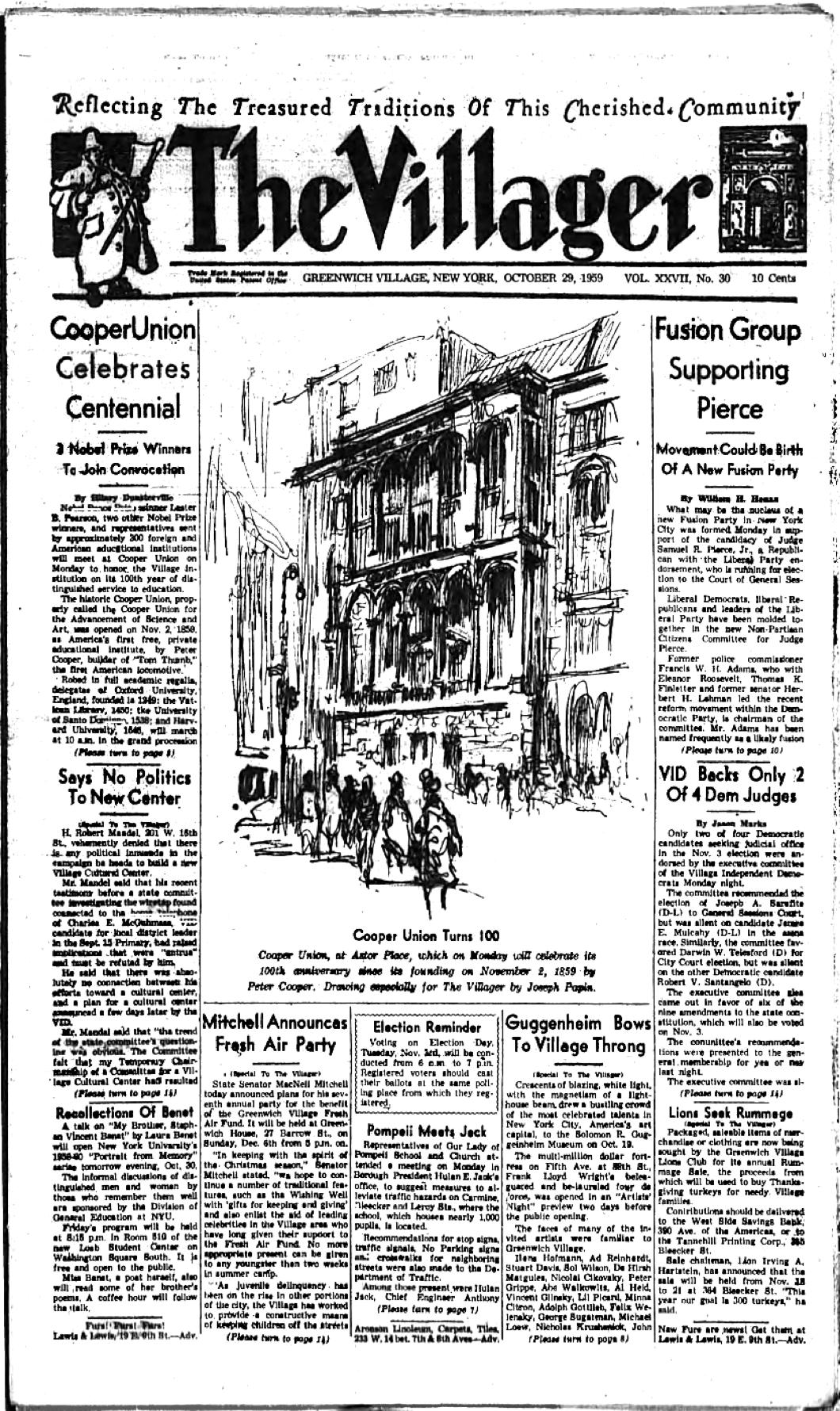
An issue from this past week in October 1959. The nameplate features distinct lettering, flanked by the supporters of a town crier (or perhaps we should say village crier) on one side and an image of the Washington Arch on the other.
No fewer than nine stories on the front page. (It’s a standard Cusackian rule of newspaper design that the more stories on the front page the better off you are.)
There is also a helpful reminder of the upcoming election so Village denizens can do their civic duty. (more…)
Andrew Graham-Yooll

A giant of Argentine journalism died this summer: Andrew Graham-Yooll.
Born in Buenos Aires early in 1944 to a Scottish father and an English mother, Graham-Yooll made his name at the premier institution of Anglo-Argentina, the now-defunct daily Buenos Aires Herald which he joined aged 22 in 1966.
“The Herald newsdesk supped for Dutch courage a local brandy,” the Times notes, “supplemented with a pâté that Graham-Yooll made of goose livers lashed with gin. A chain-smoker, he would construct tiny houses from matchsticks.”
As the Herald’s news editor during Isabel Perón’s presidency he published the names of dissidents who had gone missing or “disappeared” and, more bravely, continued to do so after Señora Perón was succeeded by a military junta.
The new rulers, who Borges warmly welcomed as “gentlemen”, put Graham-Yooll on trial for publishing interviews with the guerrillas who were terrorising the country. He was acquitted, but accepted the gentle advice of the judge who suggested he might find existence more comfortable outside the borders of the Argentine Republic.
Graham-Yooll continued writing for the Daily Telegraph and Guardian in Great Britain but made a brief foray home in 1982 during the Falklands War before being permanently welcomed home by a democratic government in 1984. Ten years later he was appointed editor of the Herald.
“Things you think you can rely on and trust are just not there,” Graham-Yooll said in Edinburgh when picking up his OBE in 2002.
“You can’t trust the bank, you can’t trust the post office or the people who sell you a house. You can’t trust the politicians, obviously. It’s a friendly society but it lacks strict rules. It’s evil, but it is also attractive to live in a place where you don’t have to live by rules.”
“I don’t know where I could go now. It was always home, even in the worst days, and it still is.”
In quotidianis disputationibus clarus
The indispensable Canadian disputationist David Warren wrote a piece mentioning Sudharma, the only newspaper printed in Sanskrit, the “dead” language of ancient India. It reminded me of the story of when someone asked Borges if he knew any Sanskrit. “Only the Sanskrit everyone knows,” was the Argentine’s response.
Anyway, given that there’s a daily newspaper in Sanskrit, Mr Warren thinks it would be entirely for the good that a daily newspaper be published in Latin.
Why not just publish a good newspaper in English, you ask? (After all, these are severely lacking or perhaps non-existent.) Not enough, Mr Warren argues:
An honest and rational account of what is happening in the world would have to be politically incorrect, in the extreme. People would be outraged, and the ACLU would move to suppress it right away. There would be protests, and attacks by Antifa; racism, misogyny, homophobia, would be alleged. The staff would not be safe to come to work.
Anyone caught reading it near a university would immediately be surrounded by shrieking harpies, and their careers in academia or elsewhere would end. Something like the #MeToo movement would be launched on Twitter, to root these people out.
Whereas, a newspaper in Latin would pass right under the progressive radar. Only those who could read Latin would take it, and almost all of them are mentally stable. Others would be trying to learn Latin, so they could also find out what is going on. Their efforts would contribute to the Catholic underground, where Latin use is spreading.
Expert Latinist Mons. Daniel Gallagher then took to the metaphorical presses of the same inprint to argue that:
Equidem desidero, potiusquam parvam sanitatis insulam, acta diurna praebere quae tot disceptationes ac disputationes provocent quot in lingua Latina, per linguam Latinam atque circa linguam Latinam provocatae sunt per saecula. Haec enim dirigam acta diurna non tantum ad principes verum etiam ad populum ipsum.
By which, in a manner of speaking, he meant:
Rather than offering “a little elitist island of sanity and spiritual calm,” I would want the paper to generate as much lively discussion and debate as always has and always will be generated in, around, and through Latin. I would want to aim the paper at the populus and not just the principes.
And Mr Warren then replies to the reply thus (in item the second).
Go and read all three; they make sound arguments.
II. A Brief to the People – by Mons. Daniel Gallagher (27.I.2019)
III. Two Items – by David Warren (29.I.2019)
All Change for Argentine Newspapers
BsAs Herald emerges as weekly as La Nación goes tabloid

Not Lucas de Soto
One of the saddest pieces of news to hit the Cusackosphere in 2016 was word that the Buenos Aires Herald was ending its 140th year by moving from daily to weekly production. The English-language Herald has been a stalwart of its city and country and, though little known abroad, has ranked among the finest newspapers in the world. But from 2007, when Charleston’s Evening Post Publishing Company sold the Herald onwards to controversial businessman Sergio Szpolski, the paper found itself in increasingly chaotic situations. Robert Cox, Herald editor in the difficult period from 1968 to 1979, said what happened to the paper was “like a car crash”, and blamed the papers owners.
My favourite feature of the Herald was Martin Gambarotta’s weekly ‘Politics and Labour’ column — a witty and insightful peek behind the curtains of Argentine public life. Like Miriam Lord’s Dail sketches for the Irish Times, one wished it was possible to redeploy Gambarotta’s pen at will towards whichever corner of the globe one happened to be situated in.
As if that weren’t bad enough, the republic’s venerable broadsheet La Nación announced around the same time its conversion to a smaller compact size. The centre-right daily is the most prestigious in Argentina since the demise of La Prensa under Peronist persecution. While its weekend editions will maintain their broadsheet format, from Monday to Friday La Nación will be printed in a compact format similar in size to a tabloid.
Marcelo García’s explanation of the changes at the Herald can be found below. (more…)
Hamburger Abendblatt
The German advertising agency Oliver Voss created this series of ads for the Hamburger Abendblatt, Hamburg’s daily evening newspaper.
Oliver Voss have done web and print ads for the Abendblatt before but the illustrations in this series of posters strike a jovial pose, feeling perfectly contemporary while still informed by a sense of the 1950s.
The summery beach scene is my favourite.
The Anthropophagus Has Quitted His Den
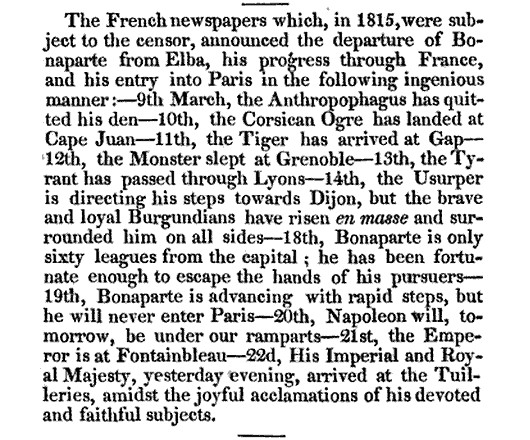
The Museum of Foreign Literature Science and Arts was a Philadelphia periodical edited by the prodiguously talented and unjustly neglected Eliakim Littell.
In January 1831 his review published this little snippet of headlines claimed to have been clipped from French newspapers:
The French newspapers which, in 1815, were subject to the censor, announced the departure of Bonaparte from Elba, his progress through France, and his entry into Paris in the following ingenious manner:
March 9 THE ANTHROPOPHAGUS HAS QUITTED HIS DEN
March 10
THE CORSICAN OGRE HAS LANDED AT CAPE JUAN
March 11
THE TIGER HAS ARRIVED AT GAP
March 12
THE MONSTER SLEPT AT GRENOBLE
March 13
THE TYRANT HAS PASSED THOUGH LYONS
March 14
THE USURPER IS DIRECTING HIS STEPS TOWARDS DIJON
but the brave and loyal Burgundians have risen en masse
and surrounded him on all sidesMarch 18
BONAPARTE IS ONLY SIXTY LEAGUES FROM THE CAPITAL
He has been fortunate enough to escape the hands of his pursuersMarch 19
BONAPARTE IS ADVANCING WITH RAPID STEPS
But he will never enter ParisMarch 20
NAPOLEON WILL, TOMORROW, BE UNDER OUR RAMPARTS
March 21
THE EMPEROR IS AT FONTAINEBLEAU
March 22
HIS IMPERIAL & ROYAL MAJESTY, yesterday evening, arrived at the Tuileries, amidst the joyful acclamation of his devoted and faithful subjects.
A thoughtful leader
As newspapers go, the Feudal Times and Reactionary Herald is devilishly difficult to obtain. Its coverage of internal squabbles within the Marxist-Lefebvrist faction of the Communist Party of Great Britain makes for compelling reading and it is likewise to be thanked for its sensitive reporting on the goings-on of various disenfranchised Indian princely families. Alas, I have never discovered whether it is possible to subscribe to this illustrious periodical, and a visit to the City of London address printed on its editorial page revealed only that the building had been bombed out during the Blitz and more recently redeveloped into a giant postmodern office block housing ‘management consultants’.
As is often the case in times of difficulty, it is not in the metropole but in the periphery one finds comfort. I am currently enjoying a few days in Wexford town (or Veisafjǫrðr as the Feudal Times & Reactionary Herald would doubtless call this old Viking settlement in Ireland). This very day I was enjoying a delicious pub lunch — stuffed chicken wrapped in bacon with peas and mash all united by a gravy of optimal viscosity accompanied by a locally brewed Schwarzbier — when I was delighted to discover next to me a copy of the illustrious title left by a previous punter. A few weeks old and already well-thumbed, it nonetheless included this thoughtful editorial regarding the recent Rhodes controversy in Oxford which our readers might, despite its pretentious prose, find interesting:
Ex Africa semper aliquid novii a Roman of old once noted. We have recently and from many quarters heard much criticism of Mr Ntokozo Qwabe — a Rhodes scholar from the late lamented Union of South Africa — concerning his call for the removal of the statue of Mr Cecil Rhodes (quondam Prime Minister of the Cape of Good Hope) from the High Street frontage of Oriel College, an institution much beloved by many of the readers of this newspaper.
As Mr Qwabe is one of those currently enjoying the fruits of Mr Rhodes’s rather typical largesse, he has doubtless left himself open to accusations of hypocrisy and ingratitude. Nonetheless, we believe a certain lassitude and forgiveness is called for in this case as recent utterances pouring forth from his loquacious tongue have proved more amenable hearing to ear-trumpets both feudal and reactionary. For we are informed the young scholar has a new target in his sights: the tricolour flag of the dreaded French Republic. Mr Qwabe has called for it to be banished from the streets and quadrangles of both town and university, deriding this “violent symbol” of a republican regime that has “terrorised innocent lives”. Such a forceful allusion to the regicides of 1793 is to be welcomed firmly.
True to their typical form, the tweeded, begowned, and enscarfed undergraduates of Oxford’s colleges have taken up Mr Qwabe’s plea. Already the blue-white-and-red flag which until recently hung from the Pierre Victoire restaurant in Little Clarendon St has been replaced by a lily banner. It is regrettable, though, that a screening of ‘Le roi danse’ at the School of Modern Languages resulted in intermittent street violence between roving bands of rival Legitimiste and Orleaniste students, egged on by Bonapartist townsfolk from working-class enclaves in Jericho and Cowley. (The biretta of an innocent Oratorian is believed to have been knocked off in the ensuing melee.)
Mr Qwabe may have arrived on these shores with plans for revolt and ‘transformation’ but it is clear that Oxford is having its usual desired effect on this bright young man. Tumult is giving way to torpor, and doubtless this Rhodes scholar will return to the happy land of the assegai and the rondavel a good deal more broad-minded and reactionary. We wish him well.
Letter to the Editor
SIPPING a postprandial Coke last week while flipping through the Irish Times, my wandering eye was drawn towards that newspaper’s report on the Madrid congress of the European People’s Party, the grouping of Christian-democratic and centre-right political parties across the European continent (Madrid congress provides forum for delegates from EU centre-right parties, Suzanne Lynch, Irish Times, 22 October 2015). The correspondent first elucidates some of the purpose of these pan-European gatherings before going on to summarise a number of the issues raised. She ends, however, on a bit of a downer by describing Hungarian Prime Minister Viktor Orbán’s “lurch to the far right”, evidenced by his “clampdown on media and internet freedoms, apparent support for the death penalty and hardline approach to refugees”.
This breezy litany of crimes is little more than shoddy journalism. The alleged “clampdown” refers to proposed internet legislation which has been withdrawn while other media laws requiring balance reflect the U.S. broadcasting rules rescinded under Ronald Reagan. The “apparent support” for capital punishment is another damp squib: Orbán called for it to be debated as intellectual speculation — a canny “dog-whistle” political move to gain votes without requiring any legislative action or serious challenge to the E.U. ban on the death penalty. (It was abolished in Hungary at the fall of communism and there are absolutely positively no government plans to bring it back.)
The refugees allegation was the most interesting, however. As it happened, I had attended a small meeting of British MPs and Hungarian foreign ministry officials the day before Ms Lynch’s report was printed. The Welsh MP David Davies gave his first-hand account of visiting the refugee camps near the Hungarian-Serb border and reported that refugees were being well-looked-after, with the quality of the facilities on the whole at least as good as when he was in the British Army, often better. An advisor from the Hungarian Foreign Ministry briefed us on the general situation, which has calmed down immensely since the Serb border has been more or less closed. He noted that broadcast media across the continent showed footage of Budapest police’s treatment of migrants gathered at the railway station without pointing out that the police were responding to violent attacks from a small minority of migrants.
Proprotionate self-defence for officers of the law is the norm across Europe, but this has mattered little when it comes to depictions of Hungary: the bien-pensant official groupthink is that anything Hungary does is wrong, so long as Fidesz is in power. Luckily some voices of dissent have emerged. The novelist Tibor Fischer — no conservative — described in The Guardian the media treatment of Hungary as “hysterical” and “ignorant nonsense”.
Anyhow, I felt obliged to send off my “Disgusted of Tunbridge Wells” to the Irish Times and it’s very good of their letters staff to print a diverging (if abridged) opinion. The last letter to any editor I succeeded in having printed was in the Times Literary Supplement in 2008 about P.G. Wodehouse’s career in banking at H.S.B.C. Who knows what the next shall bring…

Change in the air at the Catholic Herald
Title will cease to operate as a newspaper and relaunch in magazine format
Britain’s leading Catholic publication, the Catholic Herald, will be relaunching as a magazine before the end of this year. Invites have already gone out to an event celebrating the change to be held in early December.
The relaunch might be interpreted as a move against the Tablet, which styles itself “the international Catholic weekly” and has been nicknamed “The Bitter Pill” by English Catholics for its widely perceived lack of faithfulness to Catholic teaching. The Tablet is associated with the country’s old liberal Catholic elite, counting among its trustees such figures as Chris Patten and Sir Gus O’Donnell. A Herald reader, meanwhile, is more likely to be young, intellectual, and strongly influenced by John Paul II and Benedict XVI.
When told of the news, one young churchman welcomed the change as a good move for the generally orthodox Herald against its looser rival. (more…)
Italy inspired by Wall Street
Il Foglio is one of the most interesting newspapers in the world, and quite unique. It’s not a “great” newspaper like the FAZ or the Financial Times, with reporters in every major city around the globe, but this little “sheet” — usually just four or six pages — contains both a gazette of the day’s events alongside some of the best analysis and commentary in Italy. I’ve often thought that a London-based newspaper of a similar mould — not an everything-paper but instead simple, accurate, brief reporting combined with intelligent insight — could have an impact in Britain (and perhaps even America).
Its editor is the affable atheist, anti-abortion campaigner, and friend of Benedict XVI Giuliano Ferrara — an ex-Communist and former minister in Berlusconi’s first cabinet in the 90s — and it’s been said that Il Foglio comes closest to being the Italian proponent of a more Anglo-Saxon style of conservatism.
Today is Il Foglio’s eighteenth birthday, and looking back at the first edition, the design of the front page (above) obviously takes its inspiration from that of the Wall Street Journal. Things have changed since then, and while the Italian daily still clings proudly to its broadsheet format, the WSJ converted to what I call narrowsheet in 2006, as reported by us at the time.
In honour of this anniversary, Il Foglio has made available in PDF form its first ever edition (shorn of advertisements) which you can download here. (more…)
L’Osservatore Romano goes Hungarian
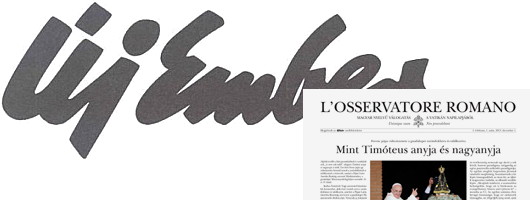
Magyarophiles will be pleased to learn that L’Osservatore Romano, the Vatican newspaper, will begin appearing in Hungarian. The new edition will appear every other week as a four-page insert into Új Ember, the Hungarian Catholic weekly founded in 1945. “We are a small editorial staff,” Balázs Rátkai, editor-in-chief of the weekly, told L’Osservatore.
“However, our intention is to probe and to make our readers think. The collaboration with the Vatican daily is of historic importance for the life of the weekly and of the entire local Church; it not only brings the Universal Church and the Pope closer to us; it will also enrich readers, and through them all of Hungarian society, with new thoughts, opinions and answers.”
Printed as a daily broadsheet in Italian, the Vatican newspaper also has weekly tabloid editions in French, Spanish, English, German, and Portuguese, as well as a monthly version in Polish.
Zeitung für Deutschland
Given my total obsession with the Frankfurter Allgemeine Zeitung it will come as no surprise that my favourite advertising installation is the massive logotype for the world’s greatest newspaper which spans the railway tracks at the Frankfurter Hauptbahnhof.
In glorious Teutonic blackletter, it proclaims the newspaper’s ownership of the city to all comers:

Photo: Erhard Bernstein
And while it looks great in daylight, as the evening descends it is illuminated in neon blue. Like the FAZ itself, old-fashioned and modern all in one.

Photo: Otzberg
IHT, RIP
New York Times Kills Off the International Herald-Tribune

The New York Times Company, owners of the Paris-based International Herald-Tribune, announced recently that they are going to kill off the 126-year-old newspaper. I had predicted back in 2009 that this was precisely what would happen because of the aimless direction the IHT had taken since the New York Times became the sole owners of the title in 2002, after a long period of joint ownership with the Washington Post. The IHT will be merged into the worldwide operations of the Times this autumn and be rebranded as the International New York Times
 Hendrik Hertzberg of the New Yorker bids adieu to the Trib, remembering the first time he left the U.S. in 1960. Crain’s New York Business provides a brief overview of NYTCo’s decision. Margaret Sullivan, the Times’s ‘Public Editor’, reduces any appreciation for the Herald-Tribune as mere emotive romantic nostalgia. Nikki Usher mourns the IHT’s tendency to broaden the Times’s typically American editorial lens. Meanwhile, Ken Layne of The Awl is a bit frank about the decision to drop the Herald-Tribune for The International New York Times: “That’s an incredibly shitty name that makes no sense at all!”
Hendrik Hertzberg of the New Yorker bids adieu to the Trib, remembering the first time he left the U.S. in 1960. Crain’s New York Business provides a brief overview of NYTCo’s decision. Margaret Sullivan, the Times’s ‘Public Editor’, reduces any appreciation for the Herald-Tribune as mere emotive romantic nostalgia. Nikki Usher mourns the IHT’s tendency to broaden the Times’s typically American editorial lens. Meanwhile, Ken Layne of The Awl is a bit frank about the decision to drop the Herald-Tribune for The International New York Times: “That’s an incredibly shitty name that makes no sense at all!”
Arab Newspapers
Having recently made my first venture into the Middle East, I thought I’d provide a brief overview of the pan-Arab newspapers that are read by exiles, businessmen, and intellectuals in Arabia and the diaspora.
FAZ and the art of newspaper web design
There is a certain pleasure in reading newspapers: the feel of the paper in your hands, the comfort of a seat in a café, the wide panoply of stories arrayed before you. Newspaper websites, on the contrary, are generally horrible. They are usually outrageously ugly (the Scotsman‘s website is particularly poor) and neither well organised nor designed with the proper aesthetics in mind. You might remember that the Times of London redesigned their website just before making it totally inaccessibly. I enjoyed their redesign at the time, but upon further consideration it seems a bit insipid.
The Frankfurter Allgemeine Zeitung, widely regarded by correct minds as the best newspaper in the world, engaged upon a wholesale redesign of their website, faz.net, in October of last year. Like the newspaper itself, there is a fine attention to detail, and I think FAZ might just take the biscuit for best online presence for a newspaper. (more…)
Die nuwe Volksblad
Not to be too Gollumesque about things, but I hates it! I always thought the Volskblad (Bloemfontein, daily, Afrikaans, f. 1904, circ. 28,000) had one of the most dignified and handsome banners of all the Afrikaans dailies. The logo of the “People’s Paper” exudes a certain classical dignity and seriousness. Previous banners (see slideshow below) conveyed an individuality. I particularly like the chiseled blackletter typeface used in the second banner displayed below: strength, dignity, tradition, age. (more…)
An-Nahar Redesign

We don’t pay much attention to newspaper design in the Middle East as their newspapers do not often show up on our radar. Al-Ahram still has a certain cachet, and I’ve always had a soft spot for L’Orient-Le Jour despite its ugly design mostly because I love their doubly old-fashioned hybrid nameplate. The Lebanese newspaper An-Nahar recently underwent a bit of a redesign which might be worth taking a brief look at. (more…)
Cross-Border Raids into Finance

The St James’s offices of Aim-quoted Cluff Gold in London resemble an explorer’s den: an antique globe, exotic objets d’art on the walls and a bust of Jan Smuts, the South African statesman, greeting visitors in the corridor.
It is the work of Algy Cluff, the buccaneering 71-year-old chairman of the west African gold producer. Just returned from shooting guinea-fowl in the Kalahari Desert, Mr Cluff’s air of patrician derring-do could have been sketched by the pen of Evelyn Waugh.
Having worked in Africa long before it became a fashionable investment destination Mr Cluff is modest about the key to success in frontier markets: “Good manners.”
It used to be the certifiable Cusack position that the realms of finance & business were dead dull and to be avoided at all costs. I do read the Financial Times fairly often — especially for its praise-worthy and restrained weekend edition — but I’ve always steered well clear of the Companies & Markets section that appears in the paper’s Monday-through-Friday editions. A week or so ago, inspired by some bizarre exotic curiousity, I wandered over the borders into the territory of Companies & Markets for the first time, and was fascinated by the intricacy of what I found, as well as how interesting it all was.
Also, when younger I thought only boring people went into finance, but after graduating from university and seeing everyone toddle along their various paths, I find that about half the fun and interesting people I know have ended up doing somethingerother financial — another assault on Cusack’s anti-finance defences. I am aided in my exploration of this intricate world by a nifty little book I’ve stolen from a friend’s collection: How to Read the Financial Pages by Michael Brett; basically finance for layfolk such as yours truly. And of course I am still enjoying Philip O’Sullivan’s Market Musings.
Admittedly, much of this is sparked by the initial public offering of Glencore. There’s something splendidly boyish and fun about commodities (especially gold, as the above-mentioned Mr Cluff surely knows) and Glencore’s massive corner of the global commodities market is truly beyond the dreams of avarice. There is, apparently, gold in them thar hills.
Search
Instagram: @andcusack
Click here for my Instagram photos.Most Recent Posts
- Burns Tower April 19, 2024
- Patrick in Parliament March 18, 2024
- Articles of Note: 13 March 2024 March 13, 2024
- Cambridge March 9, 2024
- Taken on Trust March 4, 2024
Most Recent Comments
Book Wishlist
Monthly Archives
Categories



